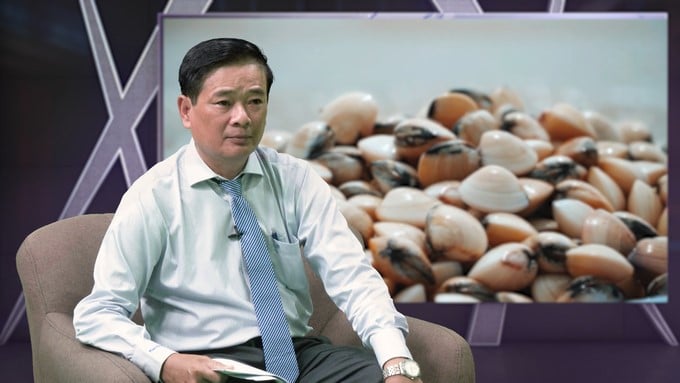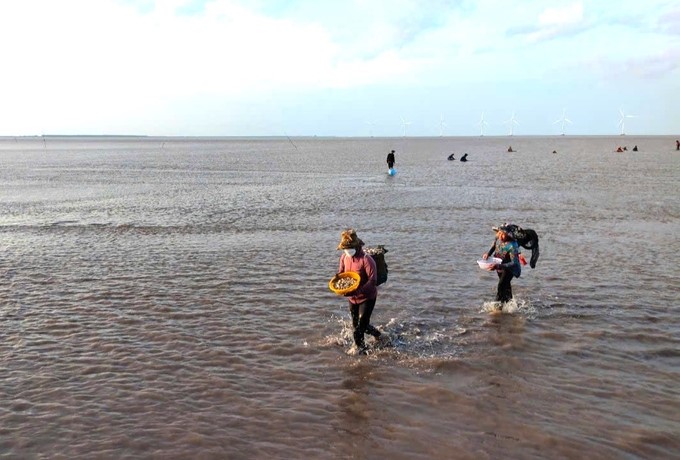June 23, 2025 | 05:40 GMT +7
June 23, 2025 | 05:40 GMT +7
Hotline: 0913.378.918
June 23, 2025 | 05:40 GMT +7
Hotline: 0913.378.918

Mr. Nguyen Van Buoi, Deputy Director of the Ben Tre Department of Agriculture and Rural Development, shared at the talk show on the clam value chain conducted by Vietnam Agriculture Newspaper. Photo: Kim Anh.
Previously, the clam value chain in the Mekong Delta was simply a linkage between producers and consumption units. However, currently, this value chain needs to have more subjects such as input suppliers, producers, product-consuming businesses, policymakers, etc.
In fact, in Ben Tre province, the clam value chain has been formed since 2001 in the form of horizontal and vertical linkages between cooperatives and businesses. However, the value chain is not stable and sustainable.
After decades of building and drawing experience, Mr. Nguyen Van Buoi, Deputy Director of the Ben Tre Department of Agriculture and Rural Development, affirmed that businesses have a very big role, playing a leading role in the industry.
This is proven by the fact that businesses grasp accurate information about the market and promptly forecast annual output, clam size, etc. From there, cooperatives flexibly apply technical solutions to help clams grow quickly, achieve productivity, and supply businesses under export contracts.
In addition, businesses are also the focal point for price forecasting, ensuring stability, so cooperative members will feel secure in production and trust in the operation and management of cooperative leaders.
"Since Ben Tre's clam industry developed according to the value chain of MSC standards, with the participation of businesses, the profits of cooperative members have become increasingly better. People trust and accompany cooperatives in producing and consuming clams," emphasized Mr. Buoi.
Dr. Huynh Van Hien, Head of Faculty of Fisheries Management and Economics, College of Aquaculture and Fisheries (Can Tho University), added that to clearly recognize the necessity of production along the value chain for the clam farming profession, it is essential to review the production method.
Clams are especially sensitive to the environment, so if farming households do not have effective technical solutions, they are susceptible to risks during the production process.

Production and processing techniques are important factors for clams to maintain quality and ensure export requirements. Photo: Kim Anh.
Dr. Hien acknowledged that currently, clam farming cooperatives in Ben Tre province have had an orientation and vision for the profession. People are more responsible in producing, managing, exploiting, and trading clams. The current production trend is "selling what the market needs, not selling what we have," and the clam industry is no exception.
Previously, Dr. Hien participated in a number of research topics on the clam value chain in the Mekong Delta, including Ben Tre province. The expert affirmed that the important issue that needs attention in the chain is quality. The product must have high production and processing techniques. Specifically, clams must not contain sand, or a shipment must not contain dead clams.
MSC certification is considered a great advantage for actors participating in the clam value chain to have the opportunity to increase product value. Through production according to three principles of the MSC evaluation criteria set, including preserving parent clam resources; reasonable exploitation planning; and good protection of existing natural clam seed resources. This is also a requirement to ensure that clam areas are assessed and maintained annually.

The development potential of the clam industry in the Mekong Delta is still very abundant, and there needs to be a comprehensive and fundamental solution to create a source of quality seed to supply to farmers. Photo: Kim Anh.
Currently, the clam industry's export value is about USD 80 million (2023). This is the mollusk product with the largest export turnover. The main markets for Vietnamese clams are Spain and Italy, with the two main products being frozen steamed clams and clam meat. Market demand for these products is now increasing.
In 2009, the entire clam area of Ben Tre province received MSC certification from the Marine Stewardship Council. This is the first fishing industry in Vietnam and Southeast Asia to achieve this certification. 5 years later, Ben Tre continued to receive MSC certification for the second time and was re-certified for the third time in 2024.
The annual output of MSC-certified clams in Ben Tre province reaches an average of 7,500–8,000 tons, with an estimated value of about VND 200–250 billion, thereby creating jobs for thousands of workers.
Translated by Thu Huyen
![Turning wind and rain into action: [9] Digitizing hydrometeorological data in response to climate change](https://t.ex-cdn.com/nongnghiepmoitruong.vn/608w/files/news/2025/06/17/z6704423696987_15fd32ffc26d590d204d520c9dac6786-nongnghiep-165943.jpg)
(VAN) Farmers have begun accessing hydrometeorological applications to adjust their cropping schedules, aiming to ensure productivity and adapt to climate change.
![Turning wind and rain into action: [8] Real-time salinity detection and early warning technology](https://t.ex-cdn.com/nongnghiepmoitruong.vn/608w/files/news/2025/06/17/z6704423696987_15fd32ffc26d590d204d520c9dac6786-nongnghiep-151127.jpg)
(VAN) Thanks to the integration of modern hydrological-hydraulic models, remote sensing technologies, and artificial intelligence, the accuracy of hydrological forecasting has significantly improved.
![Turning wind and rain into action: [7] Early disaster warnings help marine farmers minimize losses](https://t.ex-cdn.com/nongnghiepmoitruong.vn/608w/files/news/2025/06/17/z6704423696987_15fd32ffc26d590d204d520c9dac6786-nongnghiep-142942.jpg)
(VAN) In recent years, thanks to early disaster warnings and forecasting, marine farmers in Khanh Hoa province have been able to reduce risks and losses, thereby improving production efficiency.
![Turning wind and rain into action: [6] ‘Four on-the-spot’ disaster management software](https://t.ex-cdn.com/nongnghiepmoitruong.vn/608w/files/news/2025/06/17/e5a48259d6a262fc3bb3-nongnghiep-183800.jpg)
(VAN) By simply activating the scenario on the disaster management software, the relevant authorities immediately know how many households need to be evacuated, where to evacuate them to, and by what means of transportation…
![Turning wind and rain into action: [5] Hue applies modern technology in disaster forecasting](https://t.ex-cdn.com/nongnghiepmoitruong.vn/608w/files/news/2025/06/17/z6704423696987_15fd32ffc26d590d204d520c9dac6786-nongnghiep-093938.jpg)
(VAN) In Hue city, modern technology has recently been applied in meteorological and hydrological forecasting and warning, helping to reduce the damage caused by natural disasters.

(VAN) A cutting-edge farming technique being implemented on an experimental ranch in Arizona's Sonoran Desert has already saved a billion gallons of water over five years, according to Civil Eats.

(VAN) Poultry and pig production and the environment can be boosted through enhanced water technology, according to new research.